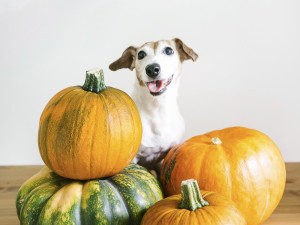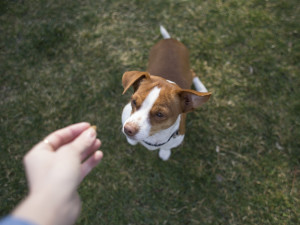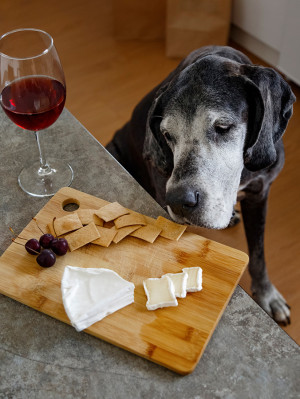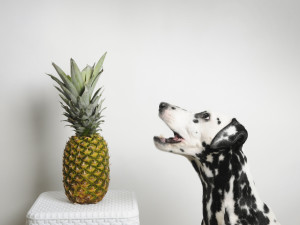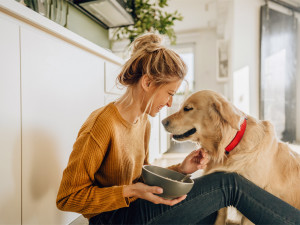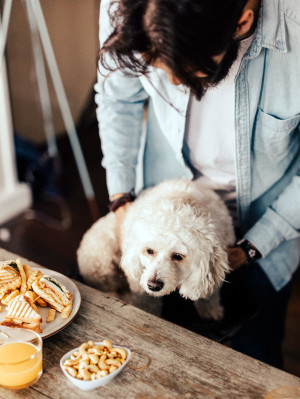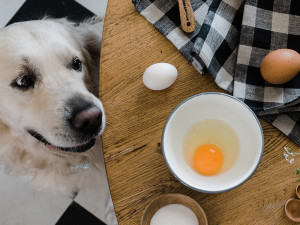
Share Article
You may have heard that cinnamon has health benefits for humans, but can it be part of your dog’s diet, too? While cinnamon isn’t considered toxic to dogs, there are important things pet parents need to know before sprinkling it on their pup’s food. In small amounts, cinnamon might offer some benefits, but too much can cause problems.
In this article, we’ll explore how to safely feed cinnamon to your dog, the potential benefits, and some precautions to keep in mind.
Is cinnamon considered toxic to dogs?
Cinnamon itself isn’t toxic to dogs, so eating a small amount shouldn’t be a problem. However, just because it’s not classified as toxic doesn’t mean it’s always safe.
Veterinarian Dr. Kathryn Dench, chief scientific advisor at Paw Originsopens in new tab, tells us that puppies and dogs with sensitive digestive systems can have GI issues if they eat too much. “From my clinical observations, while adverse reactions are rare, they can occur if cinnamon is ingested in large quantities or too frequently,” she says.

Are there potential health benefits to cinnamon for dogs?
Cinnamon is known for its anti-inflammatory and antioxidant properties, and these benefits may extend to dogs. “In practice, a small pinch of cinnamon can be beneficial for older dogs with arthritis or those with diabetes,” Dr. Dench says.
However, these benefits are usually seen only when cinnamon is given in very controlled amounts. Too much can outweigh the positives, so always consult with your vet before adding it to your dog’s diet.
How much cinnamon can a dog eat?
The amount of cinnamon a dog can safely consume depends on their size, health condition, and diet. Dr. Dench suggests less than a teaspoon of cinnamon per day for a dog weighing over thirty pounds, but pet parents can start even smaller and work their way up. Dogs have individual tolerances, so what works for one dog may not for another.
What to do if your dog eats a large amount of cinnamon
If your dog accidentally eats a large amount of cinnamon, monitor them closely for any signs of distress like coughing, choking, or difficulty breathing. Reach out to your veterinarian immediately, too, as Dr. Dench explains supportive care may be needed to manage any potential toxicity.
Are cinnamon treats safe?
Cinnamon-flavored treats can be safe for dogs as long as they’re made specifically for pets and given in moderation. “The key is to make sure that cinnamon is not the primary ingredient and that the treats don't contain xylitol, chocolate, or other ingredients that are harmful to dogs,” Dr. Dench warns.
Can dogs eat cinnamon bread or rolls?
Cinnamon bread, rolls, or other baked goods are best avoided when it comes to dogs. While cinnamon isn’t necessarily harmful, these foods are usually made with ingredients that are, like raisins, nutmeg, and large amounts of sugar.
What about nutmeg?
Nutmeg is toxic to dogs and should be avoided entirely. According to Dr. Dench, it contains myristicin, a compound that can cause seizures, tremors, and other neurological problems in dogs. “The nutmeg in pumpkin pie is one of the main reasons we see an increase in emergency vet visits around this time of year,” she says.
How to safely feed cinnamon to a dog
If you want to add cinnamon to your dog’s diet, start slowly and in very small amounts. Dr. Dench suggests mixing a small pinch of cinnamon into their regular food and checking for any signs of digestive upset, such as vomiting or diarrhea.
If your dog handles it well, you can continue to give it occasionally in small amounts. Always check with your vet first, especially if your dog has pre-existing conditions like diabetes or GI sensitivities.
Can you sprinkle cinnamon on top of dog food?
Sprinkling a small amount of cinnamon on top of dog food is generally safe. This can be a simple way to introduce the flavor without overwhelming your dog’s system, but Dr. Dench says to always watch how your dog reacts, especially if they’ve never had cinnamon before. If you notice any changes in your dog’s behavior or digestion after adding cinnamon, it’s best to stop and consult your vet.
FAQs (People also ask):
Can dogs eat cinnamon sugar?
Cinnamon sugar isn’t recommended for dogs because of the high sugar content, which can lead to obesity and other GI problems. If you want to feed your dog cinnamon, stick with plain cinnamon instead.
Can some dogs be allergic to cinnamon?
Like with any new food, dogs can have adverse reactions to cinnamon, though it’s rare. Dr. Dench says that in most cases, dogs will only show allergic reactions to cinnamon if they eat a large amount or are eating it too frequently.
Can dogs eat cinnamon applesauce?
Plain cinnamon applesauce can be given in small amounts, but make sure it doesn’t contain added sugars or artificial sweeteners. Avoid store-bought versions that contain these ingredients. If you make applesauce at home, use only a small pinch of cinnamon.
Can dogs eat cinnamon cookies?
Most cinnamon cookies are made for humans and have ingredients like sugar, butter, or even chocolate that could harm your dog. It’s best to avoid sharing these with your pup and opt for dog-safe treats instead.
Can dogs eat cinnamon oil or cinnamon sticks?
Cinnamon oil and cinnamon sticks are too concentrated for dogs and can cause irritation or digestive issues. Stick to powdered cinnamon for a safe way to share this spice with your pup.
Can dogs eat cinnamon cereal?
Most cereals, including cinnamon-flavored ones, have added sugar and other ingredients that aren’t good for dogs. It’s best to avoid sharing cereal with your dog.
Can dogs eat cinnamon oatmeal?
Plain oatmeal with a small amount of cinnamon can be safe for dogs, as long as the oatmeal doesn’t contain added sugars or harmful ingredients. A light sprinkle of cinnamon can be a healthy addition to plain oatmeal.
References:

Emily Johnson
Emily Johnson is a long-time pet writer and animal lover, working with brands like PetMD, Chewy, Whisker, Great Pet Care, Rover, GoodRX, and more on topics including pet health, training, overall ownership tips, and pet insurance. You can typically find Emily with a cat in her lap and a Diet Coke in hand, exploring the outdoors with her pup, or tending to her jungle of indoor plants. At home, she has a dog (Goose), two cats (Zoey and Nugget), and a horse (Dewey).
Related articles
Can Dogs Eat Pumpkin?
This superfood is delicious and full of nutrients—but how much is too much of a good thing?
Can Dogs Eat Almonds (and Other Nuts)?
This healthy snack for humans isn't so healthy for your pup. Here's why it's best to avoid them.
Can Dogs Eat Cheese?
We know they want to — but how much is safe?
Can Dogs Eat Pecans?
Here’s why you should keep your pup far, far away from this nut.
Can Dogs Eat Pineapple?
Pineapple is a healthy, sweet treat for dogs—as long as you feed it to your pup in moderation.
![Happy couple cooking dinner with dog watching.]()
Can Dogs Eat Garlic?
Like vampires, they should stay far away from garlic. Here’s why.
![A woman smiling at her dog while carrying a bowl of food.]()
Can Dogs Eat Yogurt?
Yes, yogurt is a safe and healthy treat for dogs.
Can Dogs Eat Cashews?
They’re not toxic, but you don’t wanna overdo it.
Can Dogs Eat Oranges and Orange Peels?
Yes, Oranges are a Nutritious Treat for Dogs
![Golden retriever looks at some eggs on the counter]()
Can Dogs Eat Eggs?
Yes, eggs are a nutritious treat for dogs.

